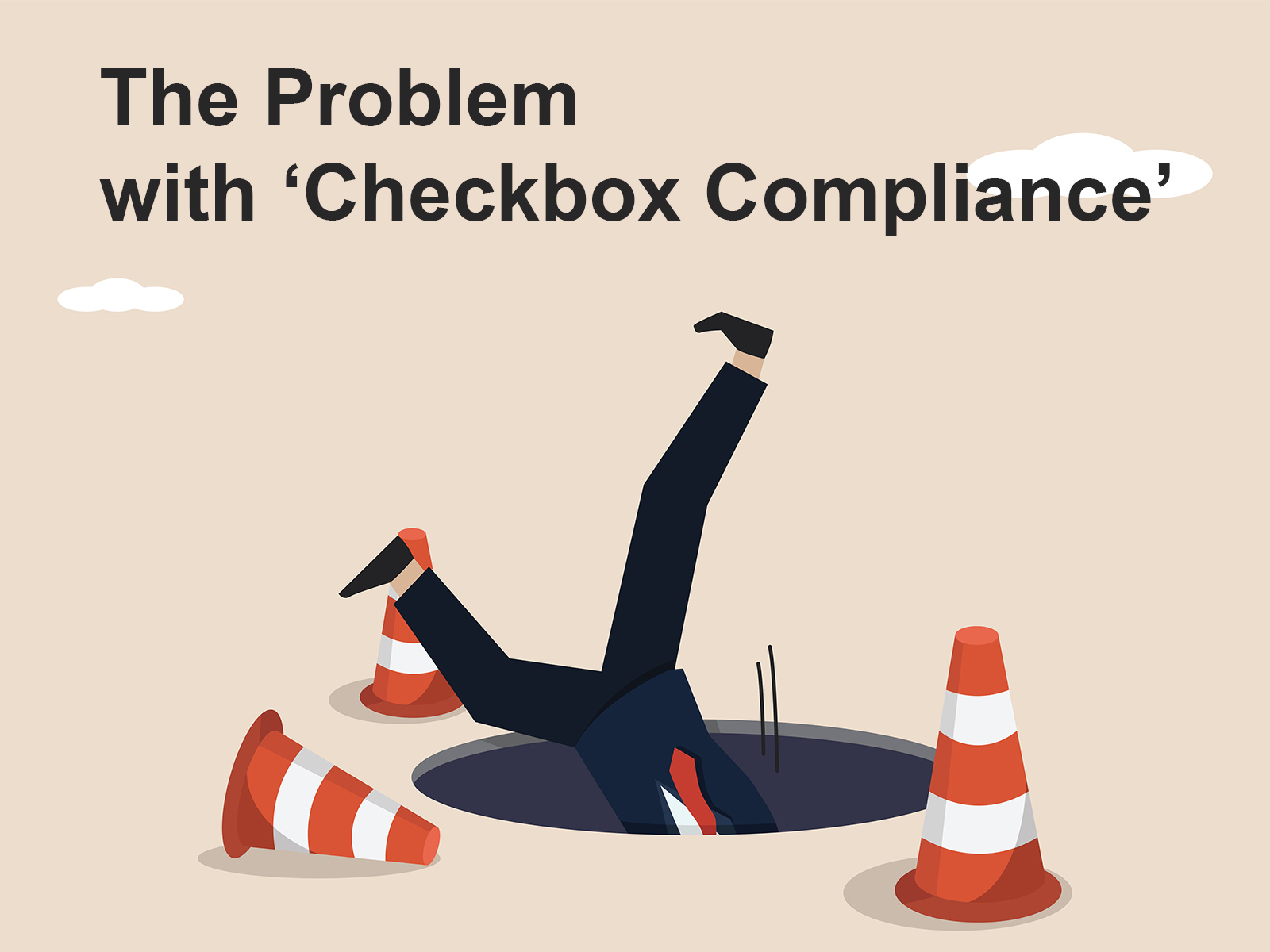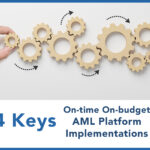
Just checking the boxes in AML Compliance raises risk of missing warning signs of financial crime
“Checkbox compliance”—whether in the personal context of doctor’s orders or the AML context of fighting financial crime—poses problems. When we settle for checkbox compliance, we often are willing to ignore the warning signs of bigger problems in favor of easier ‘solutions.’ But half measures rarely address true problems.
In Anti-Money Laundering (AML), checkbox compliance refers to a superficial or inadequate approach to AML compliance. With checkbox AML, institutions merely check the boxes to meet minimum regulatory requirements. But this approach cannot genuinely address money laundering risks. Here are some of the reasons why.
Why ‘checkbox compliance’ in AML leaves institutions exposed to bad outcomes
It’s ineffective. Checkbox compliance tends to focus on meeting regulatory requirements at a minimal level. It’s not designed to address the range of risks of money laundering and financial crime. And checkbox AML often leads to a false sense of security that leaves looming vulnerabilities unaddressed.
It risks regulatory non-compliance. While institutions may check the boxes to meet specific regulatory requirements, this does not assure a problem-free examination or audit. Regulators may uncover deficiencies in the AML program. Institutions risk potential fines,legal consequences, and reputational damage when they put their faith in checkbox compliance.
It deemphasizes a Risk-based Approach. Effective AML programs require a thorough risk assessment to identify and mitigate potential risks. Checkbox compliance often overlooks this crucial step. Instead, it defaults to generic, one-size-fits-all compliance measures that may not be suitable for an institution’s specific risk profile.
It cannot adapt quickly to meet new threats. Criminals and terrorists constantly evolve their money laundering and financial crime tactics. This requires financial institutions to adapt to new threats quickly and agilely. Checkbox compliance cannot adapt to new threats and emerging trends. This clunky stiffness of checkbox approaches leaves organizations vulnerable to evolving threats of financial crime and terror financing.
It lacks rigor in KYC CDD analysis. CDD KYC collections and risk analysis provide the first and most crucial gatekeeper against intrusions of financial crime. Checkbox compliance often results in shallow or cursory examinations of customer information. Inadequate rigor in CDD KYC can be predicted to lead to inadequate detection of suspicious activities.
It’s an ineffective use of resources. Institutions that embrace checkbox compliance allocate precious resources toward an ineffective approach. This can leave them susceptible to regulatory action and failed AML Compliance. Further, it starves resources for more valuable efforts and technologies. These could include transaction monitoring, suspicious activity reporting, Perpetual KYC, ongoing AML training, and more.
It can result in a deluge of resource-sucking false positives. Transaction monitoring and sanctions screening requires a nuanced approach. But checkbox compliance is the polar opposite of a nuanced approach. Because of this, checkbox compliance can lead to high false-positive rates. Working through false-positives consumes valuable time and resources investigating non-suspicious activities.
It can accelerate a downward slide in the “culture of compliance.” Checkbox compliance can foster a culture that prioritizes checking the boxes over a genuine commitment to AML compliance. Desires to minimize costs, maximize profits, and expedite compliance efforts can drive down cultures of compliance—and produce disastrous effects. And it makes the work of Compliance professionals exceptionally difficult.
It can weaken corporate governance. Checkbox compliance frequently erodes corporate governance. This occurs when an institution opts not to establish strong control systems and internal reporting mechanisms. This, in turn, can lead to internal breakdowns and a lack of accountability.
Choose the opposite of checked boxes for best AML Compliance–and leverage peak RegTech tools
For the reasons above, checkbox compliance represents a shallow and often inadequate approach to AML Compliance. Especially in today’s digital age, financial crime and terror financing take advantage of the always evolving and dynamic options to launder money and commit fraud. But today’s digital AML solutions can be part of the foundation of protecting your institution from being used for financial crime and terror financing.
To combat financial crime and terror financing, AML compliance should include robust risk assessment, proactive measures, and ongoing monitoring. And institutions can proactively commit to preventing financial crime—not just checking the boxes of AML Compliance. Choosing a comprehensive and diligent approach to AML protects an organization from regulatory, legal, financial, and reputational risks.
In the next installment, we will explain how AML platform technology can transform checkbox compliance into AML Compliance that adapts to changing risk and changing needs.

RegTech platform a terrific tool for AML digital transformation
With AML Partners’ platform technology for RegTech, updating and upgrading your AML and eGRC software solutions is easier, faster, and much less expensive. Contact us today to explore how platform technology and our end-to-end AML Ecosystem powered by the RegTechONE platform–can transform the efficiency and effectiveness of your unique AML Compliance efforts.
AML platform includes modules for every AML need
RegTechONE software for AML Compliance includes fully integrated modules for CDD KYC software for on-boarding, behavior and transaction monitoring software, and sanctions screening software for comprehensive AML screening. And AML Partners simplifies your end-to-end fully integrated AML Compliance efforts even further with an optional Subpoena Search module for FinCEN 314a and similar subpoena searches.
Request free proof of concept to see if AML platform is right for your institution
Contact us today to learn about our free proof-of-concept option or schedule a demo of RegTechONE, the AML software ecosystem. With extraordinary configurability and built for API extensibility, the RegTechONE AML software platformpowers not only an end-to-end AML software solution but also vendor management, AML client lifecycle management, eKYC Golden Records, Perpetual KYC, and so much more.

